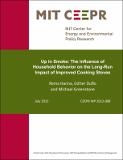Up in Smoke: The Influence of Household Behavior on the Long-Run Impact of Improved Cooking Stoves
Author(s)
Hanna, Rema; Duflo, Esther; Greenstone, Michael
Downloadmain article (961.6Kb)
Terms of use
Metadata
Show full item recordAbstract
It is conventional wisdom that it is possible to reduce exposure to indoor air pollution, improve health outcomes, and decrease greenhouse gas emissions in the rural areas of developing countries through the adoption of improved cooking stoves. This belief is largely supported by observational field studies and engineering or laboratory experiments. However, we provide new evidence, from a randomized control trial conducted in rural Orissa, India (one of the poorest places in India), on the benefits of a commonly used improved stove that laboratory tests showed to reduce indoor air pollution and require less fuel. We track households for up to four years after they received the stove. While we find a meaningful reduction in smoke inhalation in the first year, there is no effect over longer time horizons. We find no evidence of improvements in lung functioning or health and there is no change in fuel consumption (and presumably greenhouse gas emissions). The difference between the laboratory and field findings appear to result from households’ revealed low valuation of the stoves. Households failed to use the stoves regularly or appropriately, did not make the necessary investments to maintain them properly, and usage rates ultimately declined further over time. More broadly, this study underscores the need to test environmental and health technologies in real-world settings where behavior may temper impacts, and to test them over a long enough horizon to understand how this behavioral effect evolves over time.
Date issued
2012-07Publisher
MIT CEEPR
Citation
CEEPR-WP-2012-008
Series/Report no.
CEEPR Working Papers;2012-008
Collections
The following license files are associated with this item: